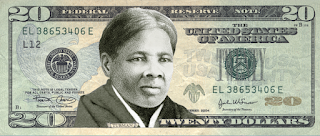The first black woman to appear on a U.S. postage stamp (in 1978) will now become the first black woman to appear on U.S currency. The mockup bill below may not be what the actual currency looks like, but come 2020, just in time for the one hundredth anniversary of women's suffrage in America, ant-slavery activist and slave liberator Harriet Tubman will be on the $20 bill.
Not too many women are more deserving of the honor of appearing on paper currency than Tubman, who helped runaway slaves escape through the symbolically named Underground Railroad to the North, then later, after President Fillmore signed the Fugitive Slave Act requiring runaway slaves to be returned to their masters, to Canada. (Several judges refused to convict captured runaway slaves after reading a novel penned by another Harriet - "Uncle Tom's Cabin," by Harriet Beecher Stowe.)
The $10 bill was originally supposed to have a woman on it in time for the women's suffrage centenary, but an outcry of protest by admirers of Alexander Hamilton, the first Treasury Secretary, forced teh current Treasury Secretary, Jack Lew, to rethink the idea. The popularity of the Broadway musical based on Hamilton's life might have also helped.
And when is someone going to write an opera about the life of Charles Sumner?
Tubman is replacing the overrated President Andrew Jackson, who was famous for trying to undermine the Bank of the United States and so belongs on money like Ronald Reagan's name belongs on an airport (he fired the air traffic controllers, remember). While the $10 bill will still feature Hamilton, it will depict five leaders of the suffragist movement - Lucretia Mott, Sojourner Truth, Susan B. Anthony, Elizabeth Cady Stanton and Alice Paul - on the reverse. The $5 bill will still feature President Abraham Lincoln on the front, but the back will show historic events that took place at the Lincoln Memorial, such as Marian Anderson's Easter 1939 concert and Martin Luther King Jr.'s "I Have a Dream" speech at the 1963 civil rights march.
Personally, I thought it would be cool to feature Margaret Chase Smith, the four-term U.S. Senator from Maine who was the first woman to serve in both houses of Congress and who ran for the 1964 Republican presidential nomination back when Hillary Rodham Clinton was a Goldwater Girl. Not only would Smith appearing on the $20 bill in 2020 to commemorate women getting the vote in 1920, it would coincide with the anniversary of Maine achieving statehood in 1820! But it was never going to happen.
After all, she was a Republican.





No comments:
Post a Comment